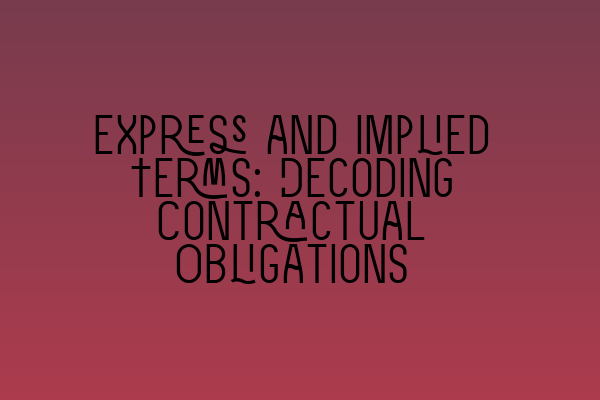Express and Implied Terms: Decoding Contractual Obligations
When entering into a contractual agreement, it is essential to understand the rights and obligations that come with it. Express and implied terms play a crucial role in determining the scope and nature of these obligations. In this article, we will delve into the concept of express and implied terms and how they shape contractual relationships.
Express Terms
Express terms are the explicitly stated provisions of a contract. These terms can be oral or written and are agreed upon by all parties involved. They outline the specific rights and obligations of each party, leaving no room for ambiguity or misunderstanding. Express terms often cover essential aspects such as payment terms, delivery schedules, and dispute resolution mechanisms.
It is vital to ensure that express terms are clearly communicated and understood by all parties. Any changes or modifications to these terms should be agreed upon in writing to avoid future disputes. For example, if you are entering into a contract with a supplier for the delivery of goods, the contract should clearly state the quality, quantity, and delivery timeline agreed upon by both parties.
Express terms can also be incorporated by reference, where a separate document or standard terms and conditions are referred to in the main contract. It is important to review these referenced terms thoroughly to understand their impact on the contractual relationship.
Implied Terms
Unlike express terms, implied terms are not explicitly stated in the contract but are implied by law or custom. These terms are based on the reasonable expectations and intentions of the parties involved and are established to fill in gaps or address issues not covered by express terms.
Implied terms can be categorized into two types: terms implied by statute and terms implied by common law.
Terms Implied by Statute
Statutory implied terms are terms that are automatically included in certain types of contracts by virtue of legislation. These terms are meant to protect the interests of one or more parties and ensure fair and equitable outcomes.
For example, the Sale of Goods Act 1979 implies terms concerning the quality, title, and fitness for purpose of goods being sold. Similarly, the Supply of Goods and Services Act 1982 implies certain terms in contracts for the provision of services.
When entering into a contract governed by specific legislation, it is important to be aware of the implied terms that may apply to the agreement. This knowledge allows you to make informed decisions and negotiate any necessary modifications to these terms.
Terms Implied by Common Law
Common law implies terms based on established legal principles and previous court decisions. These terms are not specified in legislation but have developed over time through judicial interpretation.
For example, the duty of good faith is an implied term in many contractual relationships. This duty requires each party to act honestly, fairly, and in good faith towards the other party.
Terms implied by common law are often subject to a test of reasonableness. Courts will consider factors such as the presumed intentions of the parties, industry practices, and the necessary implication of the term in question.
Interpreting Express and Implied Terms
When interpreting express and implied terms, the courts follow certain guiding principles to determine the intended meaning and effect of these terms.
The first principle is the “objective test,” which considers what a reasonable person would understand the term to mean in the given circumstances. This principle ensures that contractual obligations are not open to subjective interpretations but are based on an objective standard.
The second principle is the “contra proferentem rule,” which applies in cases of ambiguous or unclear terms. This rule states that any ambiguity or uncertainty in the contract should be interpreted against the party who drafted the contract or sought to rely on the term.
Conclusion
Understanding the distinction between express and implied terms is crucial in navigating contractual obligations. While express terms provide clarity and certainty, implied terms fill in any gaps to ensure fairness and reasonableness. By being aware of the applicable implied terms and knowing how to interpret them, parties can enter into contracts with confidence and mitigate the risk of future disputes.
If you are preparing for the SQE exams, make sure to check out our related articles:
